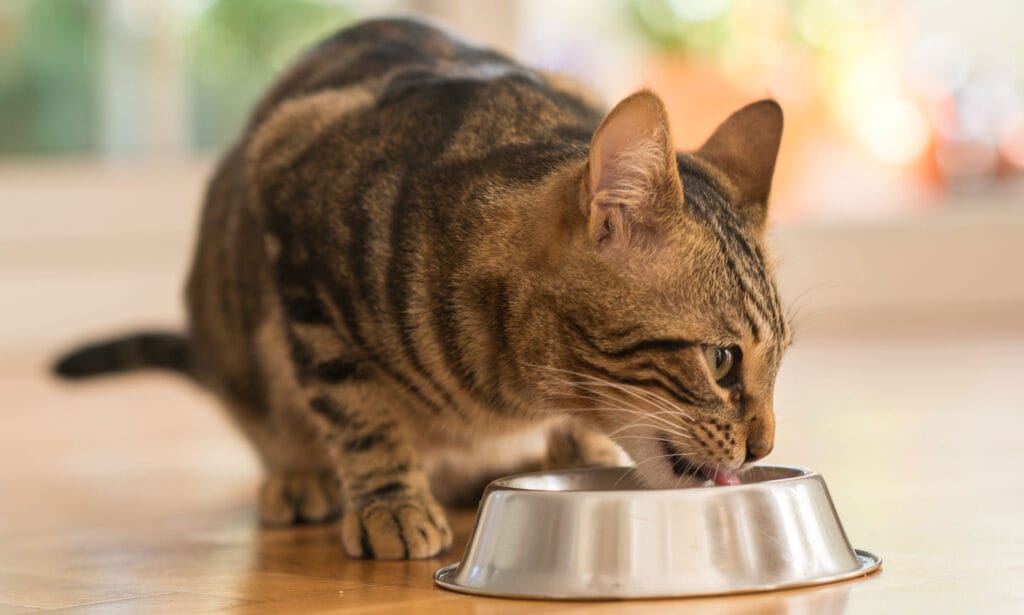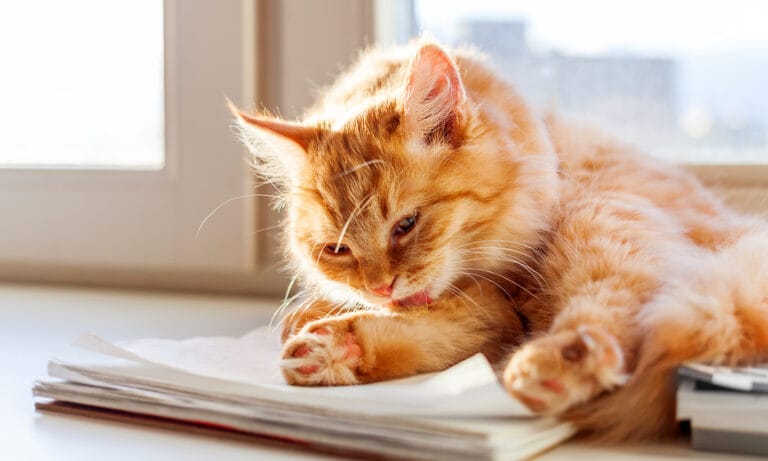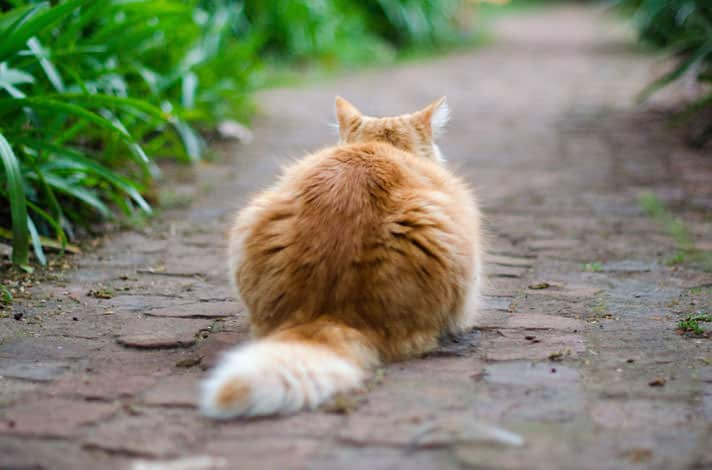Hyperthyroidism is the most common endocrine (hormone-related) disorder in middle-aged and senior cats, affecting roughly 10% of older cats. Signs of hyperthyroidism in cats typically include weight loss, increased appetite and restlessness, but how do you know for sure if your cat has it?
The first step is getting an official diagnosis from your veterinarian. Tammy Sadek, DMV, DABVP, president of Cat Hyperthyroid Radioactive Iodine Services, LLC, in Grand Rapids, Michigan, tells us what to expect during your vet appointment, as well the possible causes of hyperthyroidism in cats and treatment options.
In This Guide:
What Is Hyperthyroidism in Cats?
Cats have two thyroid glands in their neck. Hyperthyroidism occurs when one or both of their thyroid glands are overactive and produce excess hormone.
The overproduction of thyroid hormone results in an increased metabolic rate, which is why cats with hyperthyroidism typically lose weight despite having an increased appetite. This differs from hypothyroidism in cats, where the thyroid is underactive and isn’t producing enough hormone.
“There is a great deal of research being performed on hyperthyroidism in cats,” says Dr. Sadek, which will help veterinarians better understand what causes the thyroid’s malfunction.
What veterinarians do know is that excessive thyroid hormones are typically produced by a benign growth called a thyroid adenoma in one or both thyroid glands located on a cat’s neck. Occasionally, there is an ectopic thyroid tissue in the cat’s chest, and rarely, about 1–3% of the time, there’s a cancerous thyroid tumor.
No definitive research pinpoints what causes these growths, but potential contributors may include age, genetics, diet, and environmental factors.
Signs and Symptoms of Hyperthyroidism in Cats
Thyroid hormones regulate body metabolism and temperature and influence the function of multiple vital organs, including the heart, blood vessels, muscles, and kidneys.
“When excessive amounts of thyroid hormone are present, all of these organs and systems can be negatively affected,” says Dr. Sadek, who serves as immediate past-president of the Feline Veterinary Medical Association.
The most common signs of hyperthyroidism in cats are:
- Weight loss
- Higher activity levels than usual (hyperactivity)
- Increased appetite (including stealing food from other pets or off the table)
- Increased thirst
- Peeing more than usual
- More vocalization
- Anxious behavior
- Attention-seeking behavior
- Sleeping problems
- Digestive issues, such as vomiting or diarrhea
- Thin, greasy, or unkempt coat
“Sometimes there are no obvious signs of problems at home, and the hyperthyroidism is detected on routine screening laboratory tests,” says Dr. Sadek.
Diagnosis of Hyperthyroidism in Cats
Diagnosing hyperthyroidism always involves a combination of a physical examination and blood tests to get a complete picture of your cat’s health.
Before making an official hyperthyroid diagnosis, your veterinarian may go through these steps:
- Physically examine your cat’s body. This helps detect health issues, such as enlarged thyroid glands about halfway down your cat’s neck, heart murmur or arrhythmia, muscle loss or retinal hemorrhages.
- Review your cat’s health history, including any current clinical signs and symptoms or unusual behavior at home.
- Obtain a blood and urine sample to get a complete understanding of your cat's overall health. This can also be helpful to rule out any other illnesses.
It usually includes a complete blood count (CBC), blood chemistry panel, testing levels of thyroid hormone, and a urinalysis. Cats with hyperthyroidism typically show high thyroxine (T4) levels and lower than normal thyroid stimulating hormone (TSH) during a blood test, says Dr. Sadek.However, it’s difficult to outline a specific range of abnormal hormonal levels, she explains, because thyroid levels vary from lab to lab and from cat to cat based on overall health.
- Evaluate blood pressure to determine if your cat has hypertension, or high blood pressure, which if left untreated, can lead to heart disease and blindness.
Hyperthyroidism Treatment in Cats
There are four typical treatment options for cats diagnosed with hyperthyroidism—some involve managing clinical symptoms long-term, while others aim to eliminate the condition.
Talk to your veterinarian about which treatment may be most effective for your cat and your lifestyle based on benefits, potential risks for your cat’s health and treatment costs.
Feline Hyperthyroidism Medication
How it works: Feline methimazole is an oral medication that inhibits the thyroid hormone, controlling the symptoms of hyperthyroidism and helping your cat feel better.
Methimazole typically must be given regularly in its prescribed dosage for the rest of the cat’s life, paired with regular lab tests to determine if the dosage needs to be adjusted.
Benefits: Upfront, this treatment costs less than the other options.
Downsides: While this medication relieves symptoms, it does not eliminate tumors. Tumors can continue to grow (with the potential to turn cancerous) and may make methimazole less effective over time.
Because it’s a lifelong drug, over time, especially for younger cats, the financial obligation can add up.
For cats who can’t tolerate this drug, side effects include vomiting, skin issues, changes to the white blood cell count, and liver problems.
Radioactive Iodine Treatment
How it works: Radioactive iodine therapy aims to kill abnormal tissue in the thyroid gland. It’s typically provided in injectable doses in a radiation facility, where the cat will stay for monitoring for up to five days, depending on the dosage, condition, and facility requirements.
Benefits: “Radioactive iodine is currently considered the ‘gold treatment’ for hyperthyroidism, as it has a very high cure rate (95%) and a low complication rate,” says Dr. Sadek.
Downsides: High costs and potentially long travel time to the radiation facility.
After discharge, the cat and their waste may require special handling for up to two weeks. This may include limiting close contact to only 30 minutes a day and keeping them separate from other cats in the home.
Rarely, some cats develop hypothyroidism, which can decrease blood flow to the kidneys, causing kidney disease. Your veterinarian may evaluate kidney function on a regular basis.
Feline Hyperthyroidism Diet
How it works: Iodine is needed to produce the thyroid hormone. By giving cats a minimal amount of iodine through their diet, symptoms of hyperthyroidism can be controlled.
Certain therapeutic cat foods that are available with an authorization from your vet (like Hill’s Prescription Diet y/d®) contain small amounts of iodine that may help thyroid hormones return to normal levels.
Benefits: It’s less intensive than the other treatments.
Downsides: While on the diet, symptoms may be suppressed, but thyroid tumors may continue to grow.
Palatability is a common issue and is magnified because cats cannot eat any other foods, including treats, snacks, flavored medication or, for hunting cats, prey. These foods contain iodine, which makes the Y/D food ineffective. In multi-cat households, this can be especially challenging, adds Dr. Sadek.
Surgery
How it works: The cat is put under anesthesia and a veterinary surgeon removes both thyroid glands in the cat’s neck.
Benefits: Surgical removal is effective at eliminating hyperthyroidism and many cats do not need long-term thyroid supplementation if enough healthy thyroid tissue is left over after surgery.
Downsides: This might be a riskier procedure for some cats, especially those who have heart disease and/or kidney disease. Some cats have postoperative complications, including heart disease, blood pressure problems and issues maintaining normal calcium levels in the blood.
For cats with ectopic thyroid tissue, the affected area may be hidden in the cat’s chest or under the tongue, which complicates surgical removal. Other cats may require lifelong oral thyroxine supplement if there is not enough extra thyroid tissue after the procedure.
Natural Treatment for Hyperthyroidism in Cats
There are no proven natural or holistic treatments for cats with hyperthyroidism.
Life Expectancy for Cats with Hyperthyroidism
“Most cats do very well for a significant period of time with treatment,” says Dr. Sadek. This is especially true if the condition is identified and treated in the early stages.
For treated hyperthyroid cats without kidney disease, the average life expectancy is up to 5.3 years after diagnosis, says Dr. Sadek.
“Even cats with kidney disease can do very well when treated,” she says.
Untreated hyperthyroidism is typically fatal for cats, due to heart failure and debilitation.
Hyperthyroidism in Cats FAQs
Q: How do you prevent hyperthyroidism in cats?
A:Because there are no known definitive causes of thyroid dysfunction, there aren’t any effective ways to prevent hyperthyroidism in cats. Regular vet visits and routine blood work can help your vet catch hyperthyroidism early, before symptoms progress.
Q:What should a hyperthyroid cat not eat?
A:Hyperthyroid cats typically shouldn’t be on a low-calorie or restricted diet. In fact, most hyperthyroid cats need extra calories to combat their increased metabolic rate and weight loss. Ideal diets may include sufficient protein to fight against muscle loss.
Q: Do hyperthyroid cats drink a lot of water?
A:Excessive thirst can occur, but not always. If the cat is also suffering from kidney disease, you’ll likely notice an increase in urination frequency and quantity.
Q:Why do hyperthyroid cats meow so much?
A:Hyperthyroidism often leads to hypertension, which increases vocalization and meowing. Stress, anxiety, irritability, and begging for food also lead to more meowing.
Q:Do cats with hyperthyroidism have pain?
A:Hyperthyroidism does not directly cause pain, but because the disorder often increases stress and hypertension, it can also increase the cat’s perception of pain. Many hyperthyroid cats are senior cats, who suffer from unrelated health issues like arthritis or dental disease.
Every cat is unique and some cats may experience more subtle hyperthyroidism symptoms, or side effects to treatment, than others. Work with your vet to outline the best action plan for your lifestyle and your cat’s health.
This content was medically reviewed by Chewy vets.
Other health issues with similar symptoms:
Share:













